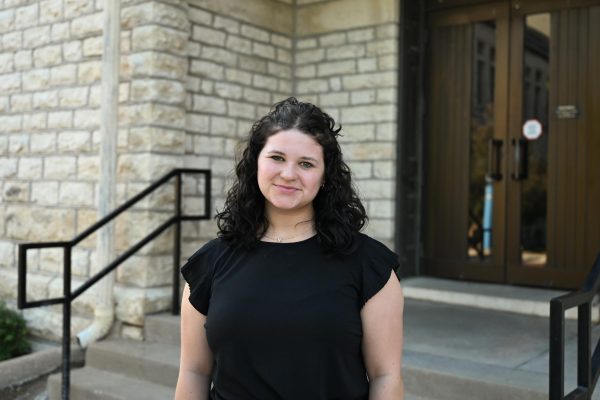When Thomas Lane, Kansas State’s vice president of academic success and student affairs and dean of students, announced the closure of the Spectrum Center on July 23, 2025, members of the LGBTQ+ community mourned the loss of one of their safe spaces on campus and in Manhattan.
Since 2010, the Spectrum Center has offered a safe haven for connection, advocacy and education for LGBTQ+ students and allies alike.
“The decision to close the Spectrum Center, effective July 31, was a difficult one, made only after thoughtful consideration of the broader policy landscape and the university’s responsibility to operate in compliance with state and federal law and guidelines,” Lane said. “This change reflects the realities of that environment, but it is not a retreat from our university’s commitment to care, belonging and student success.”
For Angel Camacho, who has spent years trying to carve out spaces for people like herself in Manhattan, this closure only reinforced what she’s experienced for years — safe spaces in Manhattan aren’t always easy to find.
Growing up in Manhattan as a transgender woman of color, Camacho experienced firsthand how isolating life can feel when your identity isn’t fully recognized or celebrated.
“I have a really weird relationship with Manhattan,” Camacho said. “I always felt like I was being repelled by the community. I’ve lived here all my life and have tried to make the best of it and also try to make community where I felt like it’s been kind of lacking.”
Within the last two years, Camacho has been trying to provide the community she felt was lacking in Manhattan while growing up.
Through these efforts, she has helped shape the local LGBTQ+ landscape. Camacho, alongside her friend, Jimbo, started Pride Nights at Auntie Mae’s and organized “The Prom You Deserved,” a queer prom for those excluded from traditional events.
“I’ve just tried to make K-State and the Manhattan area a more welcoming spot for queer people because I never felt that it’s been a welcoming spot for people like me, people of color, queer people,” Camacho said.
In addition to these events, there are other ways to find connections for LGBTQ members in Manhattan. Initiatives like K-State’s Sexuality and Gender Alliance (SAGA) and True Colors Flint Hills offer pop-up events for LGBTQ+ members of all ages to find their community and express themselves.
However, Camacho believes more can be done through K-State and the Manhattan community to provide these safe spaces for queer students and community members.
“When a privileged foundation can’t even stand up for its students, who else is supposed to?” Camacho asked. “I mean, we can do our best, queer people can, but it really makes a difference when a foundation stands its ground. That sends a message. That brings the community together.”
Camacho’s frustration highlights the importance of institutionalized support. Yet even without it, the LGBTQ+ and Manhattan communities still rallied together through a peaceful protest on Aug. 29. The protest, signifying the end of what was aptly called the “Week of Mourning,” had students, faculty and supporters of the LGBTQ+ community gathering on Bosco Plaza to hold a funeral service for the Spectrum Center.
“Seeing the community come together over the loss of something that brought them together was amazing,” Andrea Himstedt, a senior in psychology who identifies as bisexual and transgender, said. “It really brought light to how present we really were in this community.”
While the Spectrum Center may be gone, the community it fostered remains strong and continues to fight to expand. As students and allies continue to organize events, build connections and advocate for themselves and each other, the spirit of the Spectrum Center lives on — not in a building, but in the people who refuse to let themselves be pushed aside.
























































































































